Defending Democracy
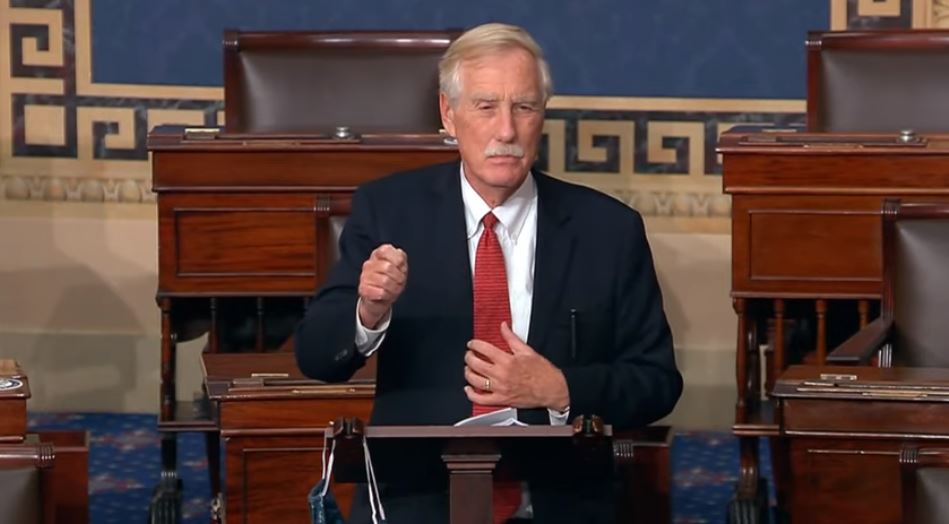
American democracy is a fragile anomaly in the tapestry of history, which has been largely defined by monarchs, autocrats, and recently, presidents-for-life. Our rare, delicate experiment is not guaranteed; it relies on each successive generation of Americans working to preserve and defend the flame of democracy. The system cannot run on autopilot, particularly as we navigate difficult terrain.
I was profoundly disappointed this month when every single GOP Senator voted against opening debate on the Freedom to Vote Act – the commonsense legislation I helped to write to improve access to the ballot for all Americans and advance common-sense election integrity reform; it took suggestions from election officials across the country in Red states, Blue states, and Purple states.
We are in the midst of a pivotal moment of American history, as our democracy is faced with dual crises: diminishing faith in our electoral process, and a political party that exploits and encourages these sentiments for short-term political gain. These phenomena threaten to undermine the very idea of America – but it doesn’t have to be this way. The Constitution grants Congress the explicit power to confront these challenges and serve as a backstop against threats and to maintain democratic norms. We must rise to this moment by enacting a set of basic protections to ensure that all Americans can vote. This is not a federal takeover of elections; it simply sets a floor so no state can enact restrictive laws that serve only to disenfranchise voters. Virtually all of these reforms in the Freedom to Vote Act are things that Maine already does.
Congress has a responsibility to meet these challenges head on, and carry forward the legacy that has been entrusted to us. Unfortunately, my GOP colleagues refused to come to the table. I have asked them repeatedly what they would like to see in an elections reform bill, but I have received no substantive responses. I want to negotiate a bill, with my colleagues from both parties, that will defend the American experiment for the next generation. I want a compromise, first and foremost. But absent that, I am open to protecting our democratic system of government through structural reforms that ensure that we protect ballot access for all of our citizens. Our elections are the backbone of America’s democracy – and that democracy is more important than any Senate rule.
Before the vote, I spoke on the floor of the U.S. Senate to stress the importance of protecting voting rights against state and local-level threats, and preserving America’s historically unique democratic system of self-governance. As I warned in my speech, we're at a hinge in history where the fate of the American experiment hangs in the balance. If you're interested, you can watch the full speech HERE.
I also spoke about the importance of this legislation in the days after the vote:
Continuing to See the Benefits of the American Rescue Plan
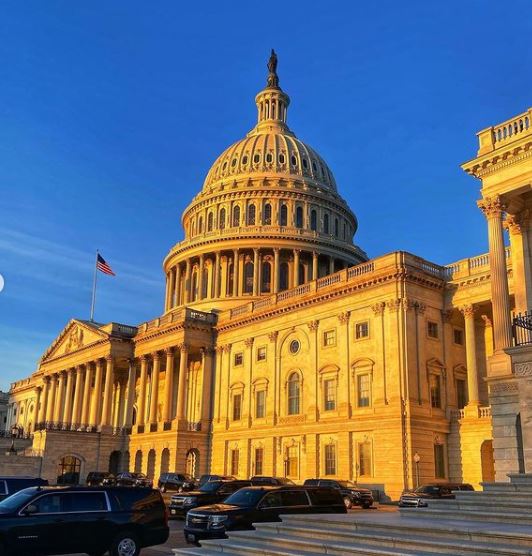
On March 6, the United States Senate passed the American Rescue Plan (ARP) by a 50-49 vote to stabilize communities and households harmed by the unprecedented COVID-19 pandemic.
I was proud to help negotiate this legislation, which was designed to save lives, support families, stabilize small businesses, make our virus-strapped communities whole, and deliver for our tireless medical and safety professionals.
In the months since, ARP funds have been allocated for and directed to Maine communities – supporting health care workers, restoring communities, helping working families, and making state and local governments whole after suffering from the strains caused by the virus.
There's a lot in the ARP, and it's been delivering fantastic support to Maine. If you're interested in reading more about how Maine people are being helped by the package, my staff put together this overview of the package's impacts on our state.
Protecting America's Cyberspace and Critical Infrastructure
.jpg)
October is Cybersecurity Awareness Month – and throughout 2021, we’ve seen that the United States continues to be far too vulnerable to cyberattacks. Earlier this year, the Colonial Pipeline, responsible for delivering gasoline to much of the East coast, was shut down by a ransomware attack – contributing to gas shortages across the seaboard – and just days ago, we saw new Russian cyberattacks against American businesses.
As co-chair of the Cyberspace Solarium Commission, strengthening America’s cyberdefense posture is one of my most important priorities – and I think one of the most effective ways to accomplish that goal is by regularly and mercilessly testing our networks to find vulnerabilities. That is why earlier this month, I introduced the CISA Cyber Exercise Act to build on existing efforts to regularly test the resilience and response of America’s critical infrastructure. By creating tools for our partners in local and state governments and the private sector, we can help them keep Americans safe and strengthen our nation’s cybersecurity posture.
However, we can't test our infrastructure against cyberattacks if we don't have the people in place to do it. There are currently tens-of-thousands of open cybersecurity jobs across the country, and great opportunities for people interested in this growing profession. I joined News Center Maine's Chloe Teboe to discuss the urgent need for cybersecurity professionals and to encourage folks to look into a career in the critically important field.
I also joined U.S. Representatives Yvette Clarke (D-N.Y.) and John Katko (R-N.Y.), at the Aspen Institute's Cyber Summit to stress America’s need for a clear and definitive cyber doctrine, and the importance of private-public cooperation as key to protecting against cyberthreats.
There's no one solution to protecting our cyberspace – it will take a commitment from the entire nation, and continued vigilance from all of us on our laptops and smartphones. Through bipartisan, commonsense actions like these, we can continually strengthen America’s cyber posture and identify opportunities to improve our national preparedness to defend ourselves against cyberattacks.
Paying What We Owe

At the beginning of the month, I joined with a bipartisan group of my Senate colleagues to raise the debt ceiling until December, temporarily avoiding an unprecedented and incredibly damaging default on the national debt. It’s the equivalent of ripping up your credit card bill rather than paying it, and the result will be the same: we would hurt our credit score, tarnish our nation’s economic reputation, and actually increase our debt due to higher interest rates.
This default would have created significant damage, including costing us millions of jobs and wiping out trillions in household wealth for families across the country. The fallout could have stopped Social Security checks, thrown Medicare into a spiral, and stopped vital paychecks for federal workers, servicemembers, and more; catastrophic isn’t a big enough word.
As I told WGME ahead of the vote, raising the debt ceiling doesn’t authorize any new spending – it's just paying the bills we already owe. It's usually a non-partisan issue; in fact, Democrats voted to suspend the debt ceiling three times in a Republican-controlled Senate during the Trump Administration – as the deficit rose $7.8 trillion in his single term.
The full faith and credit of the United States must not be a political bargaining chip – ever. I am relieved that my GOP colleagues ended their irresponsible blockade on raising the debt ceiling, avoiding a default on debts we have all helped to accrue. This issue is too serious for my colleagues to walk away from the debt they co-created for cynical political posturing. However, the work is not done; as the new deadline approaches, we need to put partisanship aside and come together to avoid a devastating default.
The American people and the global economy must understand that the United States will always pay what we owe.
Reopening the U.S. - Canada Border
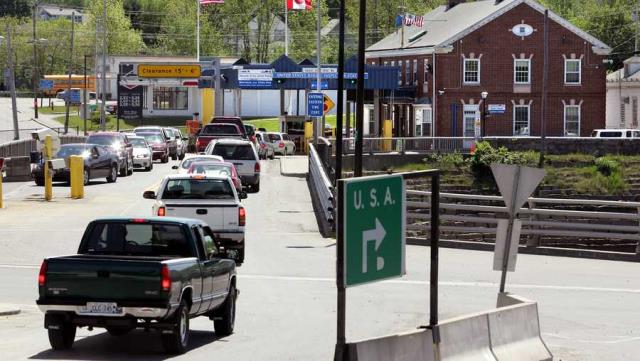
For months, vaccinated Canadians have been barred from driving across the U.S.- Canada border, even as international visitors have regularly arrived in the country via plane. That meant that a Canadian visitor wishing to go from neighboring Fredericton, New Brunswick, for example, to Presque Isle, Maine (less than a two hour drive) must first take a 3 hour flight (costing about $500) to Boston, and then drive six hours north to Presque Isle. This was a wholly unnecessary burden on visitors, and deterred fully vaccinated Canadians from supporting Maine businesses and visiting loved one.
It just made no sense – and I wasn’t shy about telling the Biden administration. I repeatedly urged the administration for this change in light of progress in COVID-19 vaccinations in both countries, and the significant disruptions to Maine families and negative impacts on our state’s businesses. That is why I was thrilled when, earlier this month, the Department of Homeland Security announced they would allow fully vaccinated Canadians to cross the U.S. – Canada border via car and ferry in early November.
The new action by the White House creates a consistent travel policy, will reconnect friends and families, and help stabilize local economies that rely on cross-border neighbors for business — a welcome action, especially as the holiday season approaches.
October Policy Update
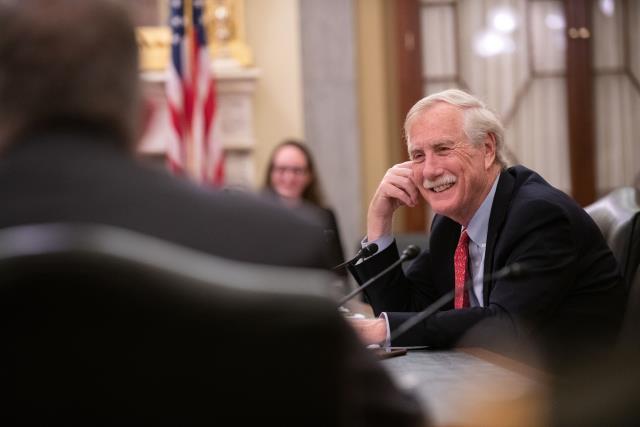
As a reminder, you can read more on my regularly updated press release page at king.senate.gov. Here are some other priorities I’ve been working on:
- Preventing servicemember suicide. I joined a bipartisan group of my Senate colleagues to introduce the Save Our Servicemembers (S.O.S.) Act, which would work to improve Department of Defense suicide prevention efforts. The legislation – which comes shortly after an alarming report revealed a 15% increase in military suicides in 2020 – would direct the Pentagon to evaluate the effectiveness of their suicide prevention efforts. Read more HERE.
- Strengthening America’s Arctic influence. Senator Murkowski and I – co-chairs of the Senate Arctic Caucus – introduced the Arctic Diplomacy Act of 2021, legislation designed to elevate Arctic issues in U.S. foreign policy by establishing an Assistant Secretary of State for Arctic Affairs who will lead and conduct U.S. foreign policy in the Arctic region and on Arctic issues. Read more HERE.
- Creating An Independent Afghanistan War Commission. I joined Senator Tammy Duckworth to introduce the Afghanistan War Study Commission Act. The legislation would establish a nonpartisan, independent commission to examine every aspect of the war in Afghanistan, including the political and strategic decisions that transformed a focused military mission into a vast, nation-building campaign that became the longest war in our nation’s history. Read more HERE.
- Supporting family caregivers. I cosponsored the Credit for Caring Act to provide working family caregivers in Maine and across the country with a tax credit of up to $5,000 to assist with out-of-pocket caregiving expenses. The bipartisan effort would provide relief for those who are taking on added financial responsibilities as family caregivers supporting a loved one. Read more HERE.
- Protecting America's Wildlife. I co-sponsored the Recovering America’s Wildlife Act (RAWA) of 2021, a bipartisan bill that would invest in proactive, on-the-ground conservation work led by states, territories, and tribal nations to support the long-term health of fish and wildlife habitat all across America. Read more HERE.
- Addressing infant health issues. I joined a bipartisan bill to address prenatal substance exposure and improve infant health. The Advancing FASD Research, Services, and Prevention Act of 2021 (FASD Respect Act), would assist early prenatal intervention by providing support to prevention efforts and for individuals and families affected by Fetal Alcohol Spectrum Disorders (FASD). Read more HERE.
In the News
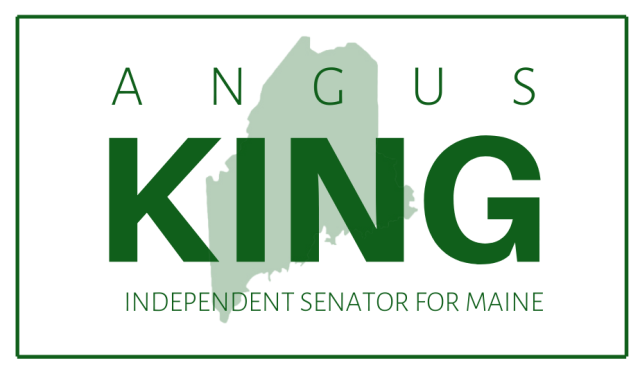
Thanks for subscribing to my monthly newsletter! I would love to hear your ideas for how we can make Maine and our country a better place. Please feel free to reach out with any questions, comments, or concerns by visiting: https://www.king.senate.gov/contact —we look forward to hearing from you.
***PLEASE NOTE***
Due to the impacts of COVID-19, my staff in Washington, D.C. are working remotely – but we’re still at work, ready to help you navigate any challenges you’re facing during this challenging time.
All the best, and stay healthy!

To unsubscribe to this e-Newsletter click HERE.
|